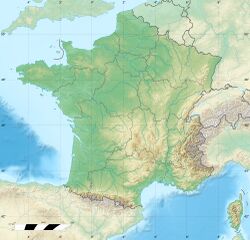Earth:Argiles d'lignite du Soissonnais
| Argiles d'lignite du Soissonnais Stratigraphic range: Ypresian ~55–50 Ma | |
|---|---|
| Type | Formation |
| Underlies | Oise River Quaternary sediments |
| Overlies | Thanetian marine green sands |
| Lithology | |
| Primary | Sandstone |
| Other | Lignite, amber |
| Location | |
| Coordinates | [ ⚑ ] : 49°18′N 2°42′E / 49.3°N 2.7°E |
| Paleocoordinates | [ ⚑ ] 44°48′N 0°00′E / 44.8°N 0.0°E |
| Region | Oise |
| Country | |
| Type section | |
| Named for | Soissonnais |
The Argiles d'lignite du Soissonnais is a geologic formation in the Oise department of northern France . The formation has provided fossil mammals, reptiles and fish as well as arthropods in the amber of the formation. The Argiles d'lignite du Soissonnais dates back to the Ypresian stage of the Eocene period.[1]
Description
The formation comprises a succession of lenticular bodies showing two main facies; clayey sands rich in frequently pyritised lignite, together with amber and grey clayey sands with less lignite (1 to 12 % of the sediment), with continental vertebrate fauna. These facies, the rarity of mollusk shells and charophytes, probably due to decarbonatation and the presence of pyrrhotite (FeS4), reflect a hypoxic environment.
The strata were deposited at the bottom of two channels cutting into underlying Thanetian marine green sands. The channels prograde toward the northeast and were discovered under Oise River Quaternary deposits.
Fossil content
The formation has provided among others the following fossils:[1]
Mammals
- Primates
- Teilhardina aff. belgica[2]
- Cantius sp.[2]
- Platychoerops sp.[2]
- Artiodactyls
- Cimolesta
- Esthonyx sp.[2]
- cf. Apatotheria indet.[2]
- Eutheria
- Palaeosinopa sp.[2]
- cf. Landenodon sp.[2]
- Ferae
- Dormaalocyon latouri[2]
- Gracilocyon solei[2]
- Oxyaena woutersi[2]
- Palaeonictis gigantea[2]
- Palaeanodon sp.[2]
- Vassacyon taxidiotis[3]
- Hyaenodonta
- Arfia gingerichi[4]
- Prototomus girardoti
- P. minimus
- Macroscelidea
- Multituberculata
- Perissodactyls
- Placentalia
- Hyopsodus sp.[2]
- Rodents
- Pliolophus quesnoyensis[2]
- Ischyromyidae indet.[2]
- Soricomorpha
- Leptacodon sp.[2]
- Wyonycteris sp.[2]
- Theriiformes
Reptiles
- Turtles
- Merovemys ploegi[2]
- Paleotrionyx cf. vittatus[2]
- Cryptodira indet.[2]
- Trionychidae indet.[2]
- Crocodiles
- Lizards
- Eolacerta sp.[2]
- Placosaurus sp.[2]
- Plesiolacerta sp.[2]
- Gekkonidae indet.[2]
- Lacertidae indet.[2]
- ?Anguinae indet.[2]
- ?Cordylidae indet.[2]
- ?Iguanidae indet.[2]
- ?Necrosaurus indet.[2]
- Snakes
- Dunnophis matronensis[2]
- Saniwa cf. orsmaelensis[2]
- Boidae indet.[2]
Amphibians
- Caudata indet.[2]
- Pelobatidae indet.[2]
- Salamandroidea indet.[2]
- cf. Koaliella indet.[2]
Fish
- Anomotodon novus[2]
- Isurolamna inflata[2]
- Lepisosteus fimbriatus[2]
- Otodus obliquus[2]
- Pachygaleus lefevrei[2]
- Palaeogaleus vincenti[2]
- Palaeohypotodus rutoti[2]
- Squalus orpiensis[2]
- Striatolamia striata[2]
- Cyclurus sp.[2]
- Heterodontus sp.[2]
- Myliobatis sp.[2]
- Notorynchus sp.[2]
- Squatina sp.[2]
- Percoidei indet.[2]
Arthropods
- Diptera
- Eurodoliopteryx inexpectatus[6]
- Coleoptera, Hemiptera, Hymenoptera, Psocodea, Arachnida[7]
Pancrustacea
- Collembola indet.[2]
- Hexapoda indet.[2]
Flora
- Nitellopsis sp.[2]
- Pinophyta indet.[2]
- Arecaceae indet.[2]
- Myricaceae indet.[2]
- Juglandaceae indet.[2]
- Lauraceae indet.[2]
- Apocynaceae indet.[2]
- Caesalpiniaceae indet.[2]
- Celastraceae indet.[2]
See also
- List of fossiliferous stratigraphic units in France
- Ypresian formations
- Ieper Group of Belgium
- Fur Formation of Denmark
- London Clay Formation of England
- Silveirinha Formation of Portugal
- Wasatchian formations
- Nanjemoy Formation of the eastern United States
- Wasatch Formation of the western United States
- Itaboraian formations
- Itaboraí Formation of Brazil
- Laguna del Hunco Formation of Argentina
References
- ↑ 1.0 1.1 Argiles d'lignite du Soissonnais at Fossilworks.org
- ↑ 2.00 2.01 2.02 2.03 2.04 2.05 2.06 2.07 2.08 2.09 2.10 2.11 2.12 2.13 2.14 2.15 2.16 2.17 2.18 2.19 2.20 2.21 2.22 2.23 2.24 2.25 2.26 2.27 2.28 2.29 2.30 2.31 2.32 2.33 2.34 2.35 2.36 2.37 2.38 2.39 2.40 2.41 2.42 2.43 2.44 2.45 2.46 2.47 2.48 2.49 2.50 2.51 2.52 2.53 2.54 2.55 2.56 2.57 2.58 2.59 2.60 2.61 2.62 2.63 2.64 2.65 2.66 2.67 2.68 2.69 2.70 2.71 Nel et al., 1999
- ↑ Solé et al., 2013a
- ↑ Solé et al., 2013b
- ↑ Bronnert et al., 2019
- ↑ Nel, 2006
- ↑ Oise amber at Fossilworks.org
Bibliography
- Bronnert, C.; E. Gheerbrant; M. Godinot, and G. Métais. 2019. First European 'Isectolophidae' (Mammalia, Perissodactyla): Chowliia europea, sp. nov., from the lower Eocene of Le Quesnoy, France. Journal of Vertebrate Paleontology 38. 1–9.
- Solé, F.; E. Gheerbrant, and M. Godinot. 2013a. The "miacids" (Carnivoraformes, Mammalia) from the Early Eocene locality of Le Quesnoy (MP7, France); first occurrence of Vassacyon in Europe. Comptes Rendus Palevol 12. 191–202.
- Solé, F.; E. Gheerbrant, and M. Godinot. 2013b. Sinopaninae and Arfianinae (Hyaenodontida, Mammalia) from the Early Eocene of Europe and Asia; evidence for dispersal in Laurasia around the Paleocene/Eocene boundary and for an unnoticed faunal turnover in Europe. Geobios 46. 313–327.
- Nel, A. 2006. Oldest records of Bombyliidae: Phthiriinae and Mythicomyiidae: Glabellulinae from the Lowermost Eocene amber of France (Diptera: Bombylioidea). European Journal of Entomology 103. 109–114.
- Nel, A., G. de Plöeg, J. Dejax, D. Duthiel, D. Franceschi, E. Gheerbrant, M. Godinot, S. Hervet, J.-J. Menier, M. Augé, G. Bignot, C. Cavagnetto, S. Duffaud, J. Gaudant, S. Hua, A. Jossang, F. Lapparent Broin, J.-P. Pozzi, J.-C. Paicheler, F. Beuchet, and J.-C. Rage. 1999. Un gisement sparnacien exceptionnel à plantes, arthropodes et vertébrés (Éocène basal, MP7): Le Quesnoy (Oise, France). Comptes Rendus de l'Académie des Sciences, Série IIA 329. 65–72.
 |


